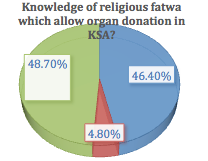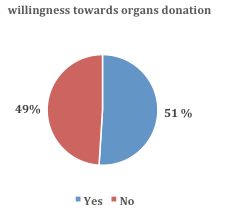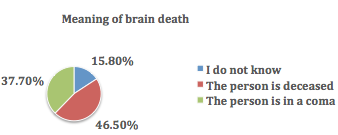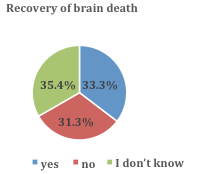



Authors
- Nourah Alzaidy
- Sarah Bin Abdulqader
- Abeer Alfardan
- Sarah AlDayel
- Waseem Hajjar
Institution
- King Saud University, College of Medicine, Riyadh, Kingdom of Saudi Arabia
Organ transplantation is the optimal treatment for end-stage organ diseases. The demand of organs has exceeded the available supply, which becomes a major obstacle worldwide [1]. Identifying the factors affecting this gap will help in overcoming this obstacle [2]. Saudi Center for Organ transplantation (SCOT), the organization supervising activities of organ donation and transplantation in Saudi Arabia [3], has contributed in the evolution of the number of well-equipped transplant centers and organ transplantation in Saudi Arabia [4].
A cross-sectional study was conducted among social media users living in Saudi Arabia. A predesigned self-administrated questionnaire was distributed online randomly on social media networks in 2015. A total of 1368 participants, only 913 met the criteria.
The results of our study showed that the majority of our respondents had their knowledge from TV and social media networks. Corresponding with other studies that showed that the primary source of knowledge was television [3] which means media has an influence on increasing public awareness. In 2007 only a small proportion (29%) had knowledge about the religious legislation (fatwa) of organ donation [2] while our study showed an increase in the knowledge of the religious legislation (fatwa) of organ donation (46%). fifty-one percent of respondents in our study were willing to donate their organs. However, previous study showed a higher percentage (73%) [5]. In our study only (35%) thought that brain death is reversible. On the contrary, in Iran (51.6%) thought it is reversible [6]. This is might be to due to the fact that the majority of our respondents are well educated of high socio-economic status.
Our study showed that the vast majority of our sample has enough knowledge about organ donation. On the contrary, they have minimal knowledge about brain death. Moreover, a fair percentage of the participants have positive attitudes toward organ donation. Also, the media has a significant effect on the knowledge of organ donation and brain death.
[1] Aldawood A, Al Qahtani S, Dabbagh O, Al-Sayyari AA. Organ donation after brain-death: experience over five-years in a tertiary hospital. Saudi J Kidney Dis Transpl. 2007 Mar; 18[1]:60–4.
[2] Alam AA. Public opinion on organ donation in Saudi Arabia. Saudi J Kidney Dis Transpl. 2007 Mar; 18[1]:54–9.
[3] Alghanim, Saad Abdullah. “Knowledge and Attitudes toward Organ Donation: A Community-Based Study Comparing Rural and Urban Populations.” Saudi Journal of Kidney Diseases and Transplantation: An Official Publication of the Saudi Center for Organ Transplantation, Saudi Arabia 21, and no. 1 [January 2010]: 23–30.
[4] Shaheen FAM, Souqiyyeh MZ. How to improve organ donation in the MESOT countries. Ann Transplant. 2004; 9[1]:19–21
[5] Mohamed E, Guella A. Public awareness survey about organ donation and transplantation. Transplant Proc. 2013; 45[10]:3469–71.
[6] Broumand M, Parsapoor A, Asghari F. Public opinion of organ donation: a survey in Iran. Clin Transplant. 2012 Oct; 26[5]:E500–4.





